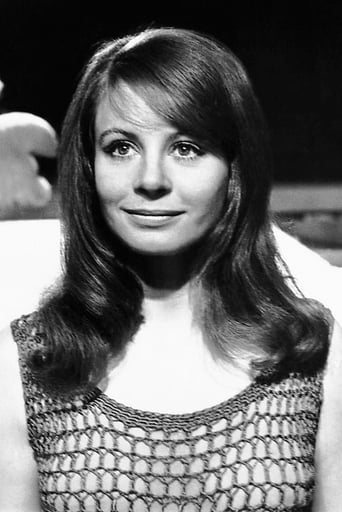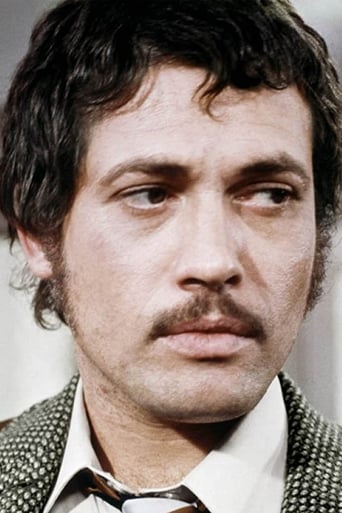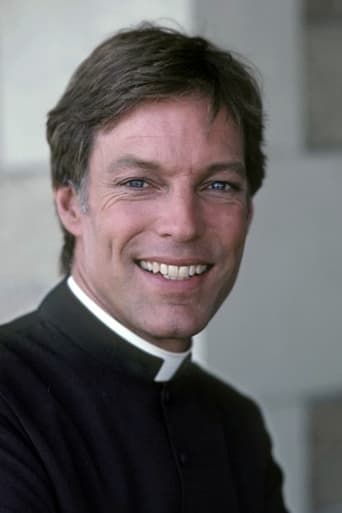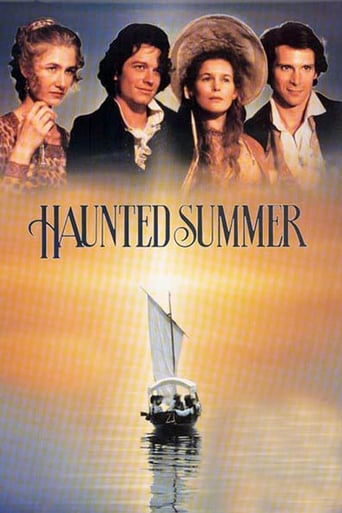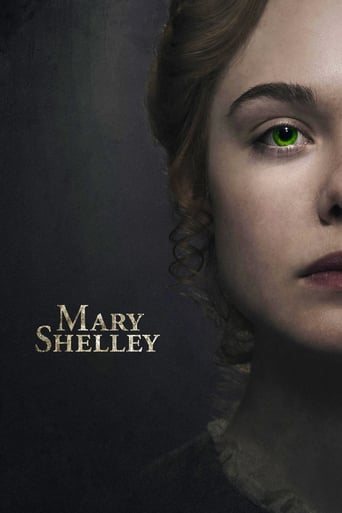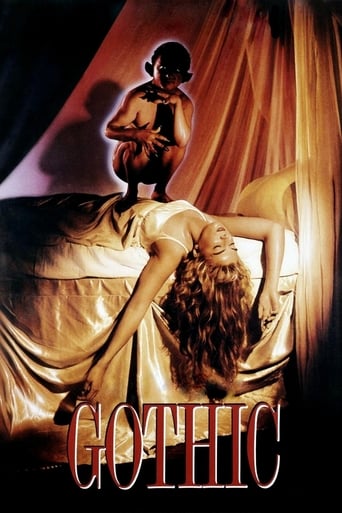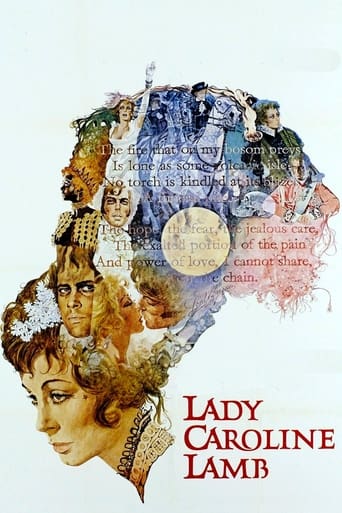
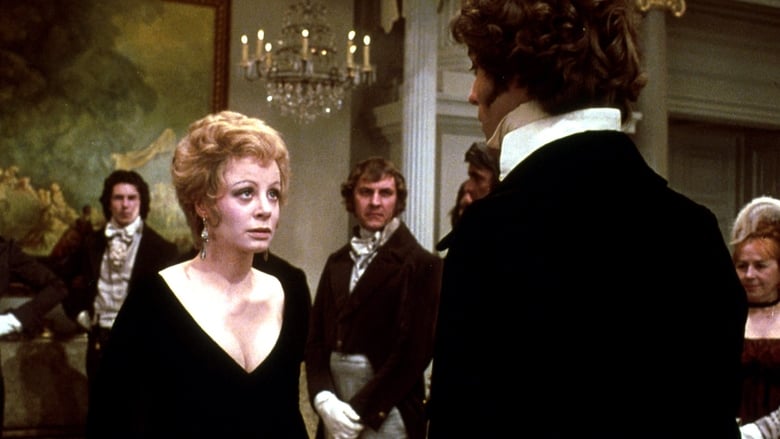
Lady Caroline Lamb (1973)
Lady Caroline Lamb, dissatisfied in her marriage, has an affair with the dashing Romantic poet Lord Byron.
Watch Trailer
Cast


Similar titles
Reviews
I gave the movie an 8 out of 10 stars--because I thought the actors gave convincing portrayals of a drug-addled Caroline Lamb, and an ambitious William Lamb 2nd Viscount Melbourne, and an equally ambitious mother of William Lamb. Without seeing Lady Caroline Lamb as one addicted to laudanum, the viewer misses an important part of the Sarah Miles portrayal; I was convinced from the acting and make up that Lady Caroline was addicted and emotionally disturbed--the cropped hair, the pale--wan look, the bugged eyes. Lord Byron, played by Richard Chamberlain came across as the cad Byron was in real life. The other actors more than fulfilled their contract and gave exemplary performances.As always, anything from Hollywood and its environs in England or Italy or Germany, etc. is to be suspect. The business of Hollywood is to tell a story, not to describe history. Apparently Lady Caroline Lamb died at the early age of 43 (in January 1828) of influenza-- the dramatic collapse of Lady Caroline is just that--drama. The viewer can readily conclude from the movie that addiction to laudanum severely compromised her health. One turns to books to verify the information in the movie.The movie portrays William Lamb as long suffering with an unstable and unfaithful wife--where in reality, William Lamb himself was no slouch in the infidelity department. William Lamb did not become Lord Melbourne till his Father's death in 1828-- after Caroline had died; Melbourne did not become Prime Minister till 1834--again, years after Lady Caroline died.The movie is available on YouTube and is worth spending the two hours it takes; like I say, I'm glad I didn't spend the $2 to see it in 1973. There were many better movies to see at that time.
This was one of four high-profile yet maligned films, all dating from the same year, which were slapped with the dreaded BOMB rating by the "Leonard Maltin Movie Guide"; conversely, the more conservative Leslie Halliwell was generally more receptive to their old-fashioned qualities! Anyway, two of these (including the one under review) had been very hard to come by, though both were quite recently shown on Italian TV – and, in fact, came across my copy of LADY CAROLINE LAMB off "You Tube" which I looked for on a whim on the occasion of co-star Richard Chamberlain's birthday! For the record, the other titles I am referring to are THE GREAT WALTZ (which still eludes me), MAN OF LA MANCHA and POPE JOAN (which has only been made available in a trimmed version and which I will be getting to presently in my Easter Epic marathon) I have always enjoyed pictures dealing with historical figures but, around the time this came out, these had acquired a Revisionist outlook which often exposed the less-than-pleasant details of their private lives. Perhaps the first to do this had been Ken Russell via a number of irreverent made-for-TV musical biopics throughout the 1960s but, by the end of the decade, his movie career had taken off in earnest – with THE MUSIC LOVERS, starring the afore-mentioned Chamberlain as Tchaikovsky, hitting the screens in 1971. Here, then, he is libertine poet Lord George Byron – first seen challenging a black man to a boxing match – who became the lover of the titular figure (played by Sarah Miles) while she was married to politician Sir William Lamb (Jon Finch). While we are told that such affairs were common practice, sometimes involving even royalty, they were mostly kept "discreet" – a term which certainly cannot be applied to the one depicted in the film. Indeed, the movie's low estimation in some critics' minds has much to do with its definite camp value: Miles, sporting short-cropped hair, is tomboyish – never more so than, when uninvited to a dinner honouring the Duke of Wellington (Laurence Olivier) due to her scandalous behaviour (with Byron opting to escort another lady), she adopts the garments of the torch-carrying lads ostentatiously accompanying his carriage around at night!; worst of all, however, she attends a costume ball half-naked and in blackface (purporting to be Byron's negro slave!) – it is here that the cracks in their relationship start to show, as she is ignored by her partner and laughed at by her peers! Having mentioned Wellington, it is also unbecoming to watch either the famed general or the celebrated thespian indulge in a one-night stand with Miles; incidentally, things would come to a head between Caroline (often referred to merely as "Caro"!) and Byron at the Duke's party, where she attempts suicide!Finch, an able orator in Parliament (a protégé of George Canning, played by John Mills, even if he stands on the opposite side in the House of Representatives), obviously suffers on account of his wife's indiscretions; indeed, he is asked to choose between her and his career by none other than King George IV (Ralph Richardson) – who had once been his own mother's (Margaret Leighton) lover! The elder woman had always resented Miles and, in fact, her coldness results in Caroline going mad at the end. Notable bit players here include Peter Bull, Pamela Brown and Michael Wilding; the production values were certainly the best that money could buy: the late cinematographer Oswald Morris, art director Carmen Dillon and composer Richard Rodney Bennett (who supplies the expected lush score).Incidentally, this was award-winning playwright/scriptwriter Bolt's sole directorial foray – which he created and personally nurtured, so to speak, as a vehicle for his real-life wife Miles. A co-production between the U.K. and Italy, it incorporated an irrelevant and fairly embarrassing scene set in the latter country as Miles and Finch go on a trip and decide to take a nightly stroll in a former gladiatorial arena – which is soon infested with wretched souls clamouring for money and grub; what makes it so bad, however, is the fact that the extras were not locals since they speak in broken Italian (even rendering "impiccati" – meaning "hanged" – as "impiegati" – workers)! As I said, then, the print I watched – interrupted every once in a while by the wording "PLAY" and related video information – was not in the best of shape but the film was nowhere near as unwatchable as I was led to believe; if anything, back in the day, it had managed to score BAFTA nominations for Richardson, Bennett and Dillon!
I loved this film the first time I watched it more than a dozen years ago. It does not surprise me that the writer and director Mr. Robert Bolt was a playwright-this film captures the best of what makes a film and a play, which is a very unusual occurrence.This film always-always captivates me with it's genius beginning-the camera is the mind of the director and writer and this mind is a brilliant and passionate one! The first minute of this film reveals Sarah Miles' character, Lady Caroline Lamb, perfectly. The rest of the film is just as honest and raw. I suppose it's the raw humaness and beauty of this film that holds me and shall always cause me to hold this film so much higher than others. I am willing to bet that because Mr. Bolt was a playwright that he had a high respect for the craft of acting-perhaps this is another reason the film is so rich-the actors are given the time to do their art. Thanks to Mr. Bolt and Sarah Miles for coming together and bringing into the world this beautiful, poetic and tender work.
This is a beautiful picture and makes me cry every time I watch it. Also Richard Chamberlain is fantastic as Lord Byron. Sarah Miles give a wonderful portrayal of the tragic woman. Anyone who can't appreciate this film has no knowledge of Lamb's inner feelings. I loved it and am glad there was a film made about one of history's most slandered women.


